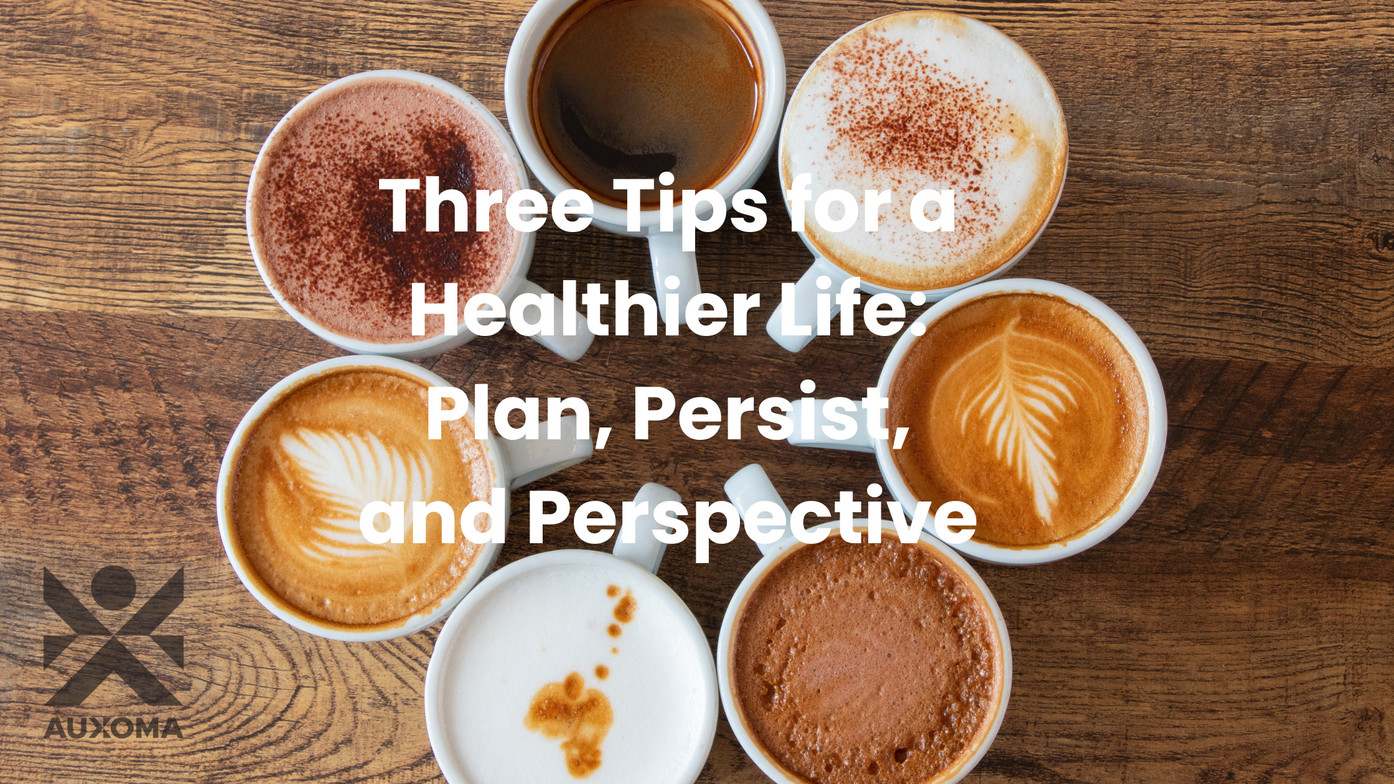
Three Tips for a Healthier Life: Plan, Persist, and Perspective
Hey there, friends! We’re diving into three practical, science-backed tips to help you live a healthier, more vibrant life. Whether you’re trying to eat better, move more, or just feel good in your own skin, these strategies will give you a solid foundation. Picture this as a chat over coffee—relatable, actionable, and maybe a little inspiring. Let’s jump in with our first tip: planning beats winging it every time.
Tip 1: No Plan Is the Worst Plan
Let me start with a confession. A few years back, I decided I was going to “eat healthy.” No plan, no structure—just a vague promise to myself to “do better.” Spoiler alert: it was a disaster. I’d grab a salad one day, then scarf down a burger the next, with no rhyme or reason. Sound familiar? That’s what happens when you don’t have a plan. Research backs this up. A 2022 study in PMC looked at long-term dietary changes and found that people who followed any structured plan—whether it was keto, Mediterranean, or just “more veggies”—were way more likely to stick with healthier habits than those who just winged it. The structured group didn’t just lose weight or feel better; they kept those changes going for months, even years. Why? Because a plan gives you clarity and purpose. It’s like having a GPS instead of driving in circles.
But here’s the real magic: you don’t need a perfect plan to see results. Just tracking your habits can be a game-changer. There’s this 2015 study from PMC that blew my mind. They looked at people using apps like MyFitnessPal to log their food. Guess what? Just the act of writing down what they ate made them more aware of their choices. People started cutting back on junk food—not because someone told them to, but because they saw they were drinking three sodas a day or snacking on chips every night. The data didn’t judge them; it just showed them the truth. And that awareness led to better choices, like swapping soda for water or adding a side of veggies. Another study from The Lancet in 2019 showed similar results with mobile health tools. People using structured programs, even simple ones, lost more weight and reported lower stress than those going it alone.
So, how do you start? It’s easier than you think. Pick a plan—any plan. Maybe it’s meal prepping on Sundays or following a Mediterranean diet. If that feels overwhelming, just download a free app like MyFitnessPal and log your meals for a week. You don’t have to change anything at first; just track. You’ll start noticing patterns, and those little “aha” moments will nudge you toward healthier choices. Trust me, having any plan is better than no plan at all.
Tip 2: The Tortoise Beat the Hare—Consistency Wins Over Time
You know the old fable about the tortoise and the hare? Slow and steady always comes out on top. When it comes to health, consistency is your secret weapon. I’ve been obsessed with James Clear’s Atomic Habits lately, and it’s packed with gems on this. Clear says about 40% of what we do every day is driven by habits. That’s huge! So, if you want to get healthier, focus on small, repeatable actions. Don’t try to overhaul your life overnight. Want to eat better? Start with one plant-based meal a week. Want to exercise? Commit to a 10-minute walk every morning. Clear calls this the “1% better” rule—tiny improvements that stack up over time. Think of it like compound interest: a little effort now grows into massive results later.
Another big idea from Atomic Habits is making habits easy and attractive. Clear suggests “habit stacking,” where you tie a new habit to something you already do. For example, I started drinking a glass of water every morning while my coffee brews. It’s automatic now because it’s paired with something I love—coffee! He also talks about tracking habits to stay motivated. Ever heard of “don’t break the chain”? You mark an X on a calendar every day you stick to your habit, like going for a walk or eating a healthy dinner. Seeing that chain of X’s grow is weirdly satisfying and keeps you going.
But consistency isn’t just about habits—it’s about syncing with your body’s natural rhythms. A 2018 PMC article on lifestyle medicine explains that our bodies thrive on regular schedules for eating, sleeping, and moving. Take food, for instance. If you’re into intermittent fasting, eating at the same times each day helps your body regulate hunger hormones like ghrelin. I tried fasting for a while, and when I kept my eating window consistent, I felt energized and focused. But when I got sloppy with my schedule? I was starving and cranky. Sleep’s another big one. WebMD says sticking to a regular bedtime—aiming for 7-9 hours—sharpens your memory, boosts your mood, and even lowers your risk of heart disease. I used to stay up late scrolling on my phone, but now I aim for 9 PM lights-out, and I feel like a new person.
Movement works the same way. A 2015 PMC study found that people who exercise at consistent times—like a morning jog or evening yoga—perform better because their bodies adapt to the routine. Your muscles get more efficient, and recovery feels easier. I started doing a quick 20-minute workout every morning, and now my body’s like, “Oh, it’s 7 AM? Time to move!” It’s amazing how your body learns to expect it.
But what happens when you throw that consistency out the window? Travel’s a big culprit. Jet lag is the worst—it’s like your body’s screaming, “What time is it?!” A 2010 study in Neurology found that chronic jet lag can mess with your brain, causing fog and even mild cognitive issues. I remember flying across time zones for a conference and feeling like a zombie for days. My sleep was off, my stomach was grumpy, and I couldn’t focus. To fight this, try sticking to your home schedule as much as you can. If you’re crossing time zones, get some sunlight first thing in the morning—it helps reset your internal clock. Consistency might not be glamorous, but it’s the foundation of a healthy life.
So, here’s your challenge: pick one habit to make consistent this week. Maybe it’s going to bed at 10 PM or eating breakfast at the same time every day. Stack it with something you already do, track it with a calendar, and watch how it starts to feel natural. Slow and steady, friends—you’ve got this.
Tip 3: Embrace the 80/20 Rule for Balance
Alright, let’s talk about a mindset shift that’s been a game-changer for me, thanks to entrepreneur Alex Hormozi. He says life follows an 80/20 rule: 80% of your days are just average, 10% are the best days ever, and 10% are the pits. When it comes to health, this means most of your days won’t be Instagram-worthy, and that’s totally fine. The trick is learning to make the most of your great days, learn from the bad ones, and nudge those average days toward awesome.
Let’s start with the bad days, because we all have them. Maybe you skip your workout, stress-eat a pint of ice cream, or barely sleep because life’s throwing curveballs. Instead of beating yourself up, channel some Stoic wisdom from Marcus Aurelius’ Meditations. He wrote, “You have power over your mind—not outside events. Realize this, and you will find strength.” I love this. It’s like a reminder that you can’t control everything, but you can control how you respond. Had a rough day and ate junk? Okay, take a deep breath, maybe go for a quick walk, and focus on a healthy dinner. A 2015 PMC study on dietary habits found that setbacks often reveal what’s holding you back—like not having healthy snacks on hand or letting stress derail you. Use those bad days as data. For me, I noticed I’d snack mindlessly when stressed, so now I keep fruit or nuts nearby to make better choices easier.
Now, the great days—those 10% when you’re firing on all cylinders. You crush your workout, eat like a nutritionist, and feel unstoppable. Aurelius has a gem for these moments: “When you arise in the morning, think of what a precious privilege it is to be alive—to breathe, to think, to enjoy, to love.” Use these days to set yourself up for success. Maybe you meal prep for the week, try a new veggie-packed recipe, or hit a personal best at the gym. I had a day like this recently where I felt so energized, I planned out my workouts for the whole month. That momentum carried over, making my average days a little better.
The goal is to tilt those 80% average days in your favor. You don’t need every day to be perfect—just a little better than before. Maybe you swap one processed snack for a piece of fruit or add five minutes to your daily walk. Over time, those tweaks add up. The Stoics and Hormozi both remind us to focus on progress, not perfection. By appreciating all your days—good, bad, and meh—you build a mindset that’s resilient and ready for the long haul.
Here’s your action step: next time you have a great day, do one thing to boost your health, like planning your meals or trying a new workout. On a bad day, be kind to yourself and pick one small win, like drinking an extra glass of water. Watch how those average days start to shine.
Wrapping It Up
So, there you have it—three tips to live a healthier life. First, get a plan and track your habits, because no plan is the worst plan. Second, channel the tortoise and stay consistent with your eating, sleeping, and moving. And third, embrace the 80/20 rule, using Stoic wisdom to make every day count. You don’t need to be perfect; you just need to start. So, what’s one small step you’re going to take today? Maybe it’s logging your meals, setting a bedtime, or just giving yourself grace on a tough day. Whatever it is, you’re on your way to a healthier you.
Thanks for joining me on this journey—I’m pumped to dive deeper on this in a podcast episode: Check out the Fractional podcast on Spotify or Apple Podcasts! Drop a comment or hit me up on social media to share your favorite tip or habit. What’s working for you? And stay tuned for our next episode, where we’ll tackle another big idea to level up your life. Until then, keep showing up, keep moving forward, and I’ll catch you soon!

Dr. Justus Kauffman
Contact Me


